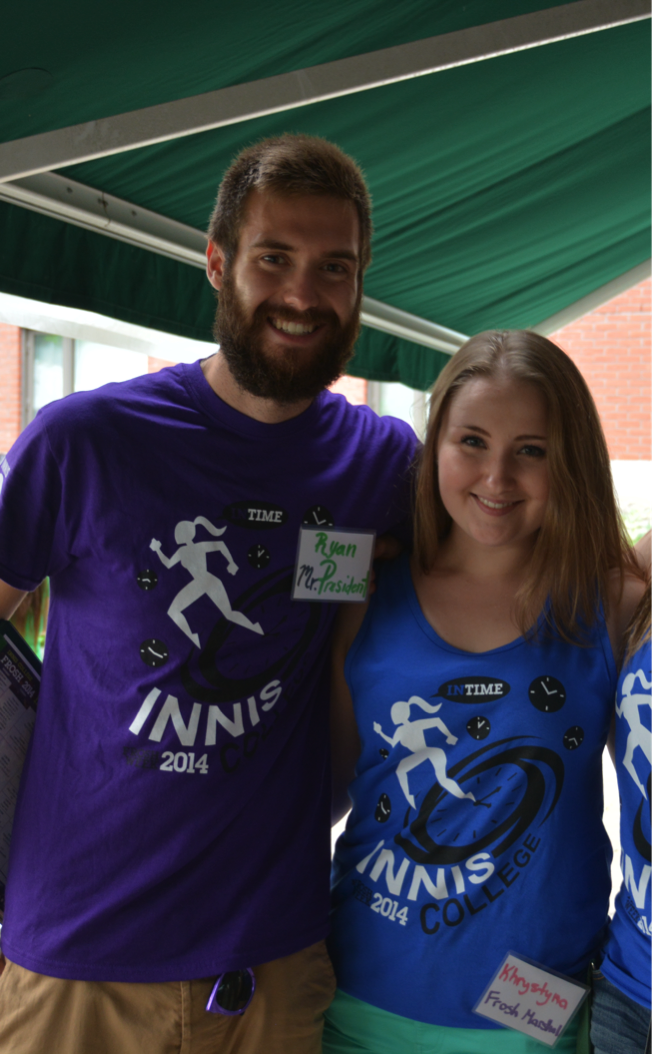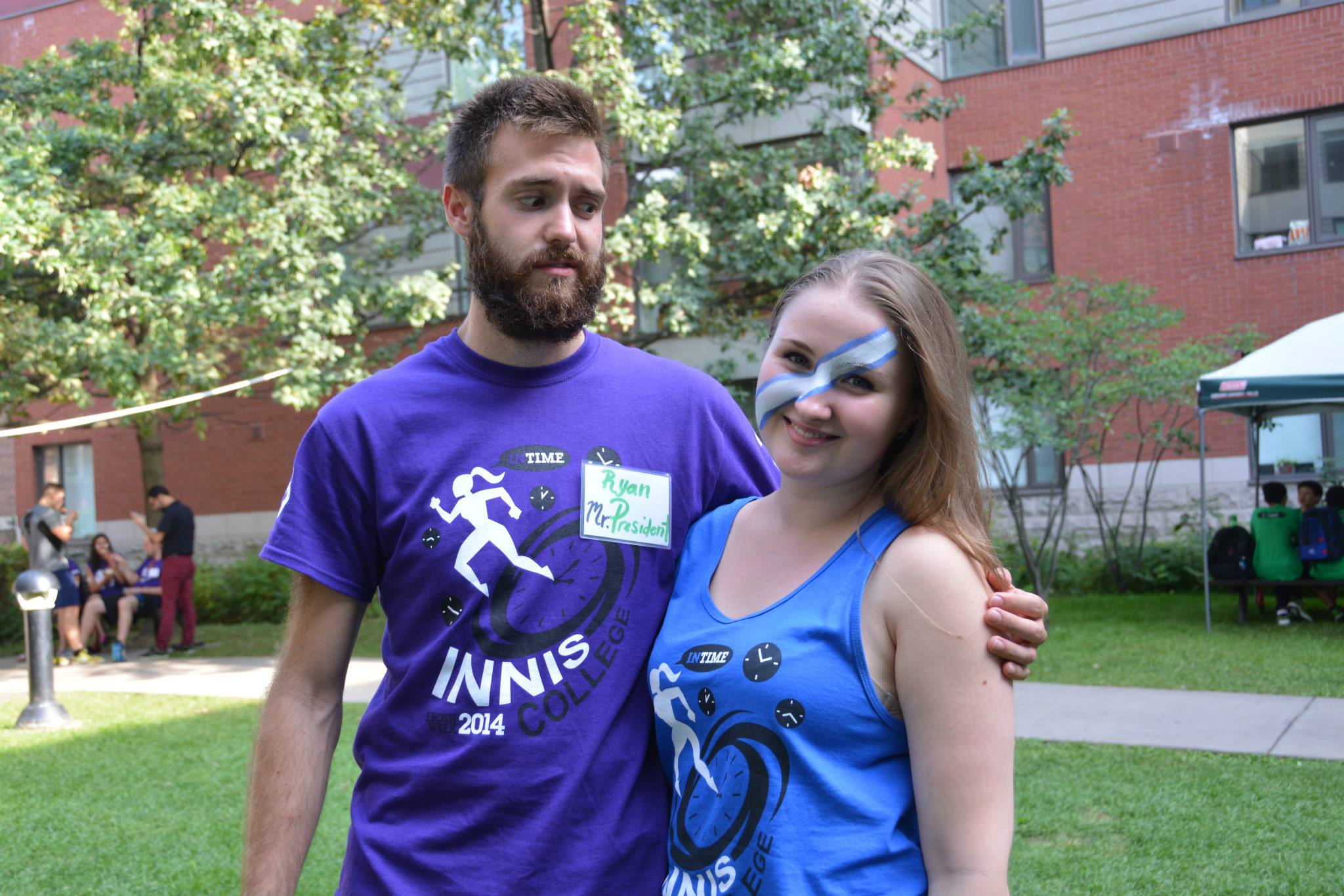Talking with the exec: the leaders of the ICSS

This month I had the opportunity to sit down with ICSS President Ryan Lamers and Vice-President Khrystyna Zhuk to hear their plans for the semester, what they think differentiates Innis and the biggest issues they’d like to tackle.
Innis Herald: How would you describe your roles on the ICSS?
Ryan Lamers: Mainly being the first line of communication with students, faculty administration and other organizations on campus. Sometimes even with organizations external to the university. If the president is unable to be on the front line- given what that conversation is about- then he or she would then delegate that conversation to someone else that is better suited to handle it. A short summary is that the President is the one that talks to the different groups and makes sure it is the right people involved in the conversations. You come with a vision for how things should play out for the year and you explain it to the people you are working with and oversee how it kind of unravels.
Khrystyna Zhuk: I guess my job is sort of similar to Ryan’s as I am always helping out with what is going on and attending a lot of meetings with other organizations. Internally, my job is to make sure other members are doing their jobs. But most of my job is working with the President.
RL: The VP is a versatile role that can assist in many ways. It’s a make it your own kind of role, when something comes up, the VP kind of steps in and gets it done.
IH: What kind of things do you want to accomplish in second semester?
RL: Second semester specifically is the issue of free printing for Innis students, which should be running by February 1st. It’s the big thing I’ve been pushing for because there’s 2000 students here
and not even half of them use the services that the University offers. So I’m trying to find a way students would be able to benefit from the fees they pay aside from social activities, and everyone needs to print assignments. The rest of the semester is dealing with the controversy around the UTSU. I’m making sure everyone around me is as informed as possible, so that when I leave they can continue on with it and move towards making the UTSU elections fair and democratic. Also, our website has not been great for a while, so we started overhauling it this year and its going to be done very soon.
KZ: Starting off with the UTSU, there’s a committee that is being created to work with them and is comprised of representatives from colleges and different student groups that want to figure out a new board structure. I’ll be sitting on the committee representing Innis to make sure there is still College representation- something that was not proposed in the board restructuring that was voted down at the last AGM. In terms of here at the College, I’m going to be working with our VP-Internal to organize the first ever ICSS reunion for our 50th anniversary to share stories and such with ICSS alumni. In general, I would like to see our council be more involved with the different type of activism that goes on throughout campus. We have taken a stance on the End the Ban campaign on campus, for example. I think it’s important for colleges to take a stand on these kinds of initiatives to show support. So I want to see the ICSS be more informed and involved. Our students are giving positive feedback on our move with End the Ban and I’m going to see if there’s anything else we can work with. We also now have access to Blackboard so that we can communicate with students, though a lot of it needs to be fixed and updated so students can have easy access to information from the ICSS, something I would like to improve this semester.
IH: How do you think your past positions on the ICSS have prepared you for your current roles?
RL: The general answer most people would give is that I learned how things would work, I was in the system for two years and I learned each year how things functioned. I saw a lot of mistakes and I learned ways that I could fix those things But for me, it was more maturity and taking the time to grow up and learn to lead a group like this while properly interacting with different people on an everyday basis.
KZ: For me, being social director developed a lot of skills and connections that I could pass on this year. A big part is event planning, and I know I’ll be here to lend a hand if needed. More generally, I feel the more you interact with council, the more you understand being professional and interactive in your role with students, admin and external connections that you acquire.
IH: Why did you guys choose Innis when you applied to U of T and what makes it different from the other colleges?
RL: I chose it because of my brother, who was an engineer living at Innis and loving the residence experience. I wanted the same sort of thing. Student parity is what makes the College different; students get 50 percent of the say when it comes to decisions being made College wide, on the Innis College Council. It’s in the by-laws where its stated students are half the room in meetings, between faculty and us. Sometimes your judges should be students so that they can have a strong voice thanks to the numbers.
KZ: I chose Innis because I was in Rotman first year and Innis was the closest college to the U of T Rotman building. I didn’t live in residence initially, so that didn’t factor into my decision. As a commuter, convenience and proximity are what made my decision. That being said, I’m very happy that I chose here because we have a small and close community. We have had a very open and rebellious mindset, which creates a lot of diversity and acceptance. There isn’t any hierarchy between students; you’re sort of on an equal level with everyone. And from seeing other colleges interact, I know this is important. I think we are really lucky to be Innis students.
IH: Do you have any final words or things to add?
KZ: Get involved! We go to the best university in Canada and that comes with a lot of academic pressure, pushing a lot of people away from getting involved especially if you’re a commuter. There’s so much more out there, there’s something for everyone. Take advantage of that because when else will you have the time to get out there?
RL: We pay a lot of tuition, and you only get fifty percent in the classroom so definitely do something else to really get the full university experience.
This interview has been edited and condensed for clarity and length.
Featured photo courtesy of Eric Vasco
